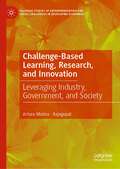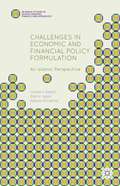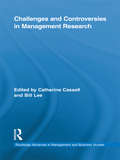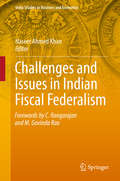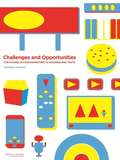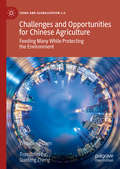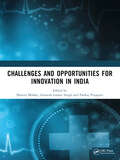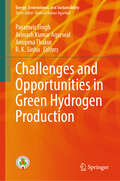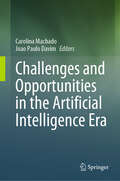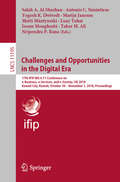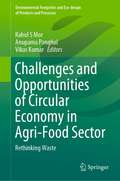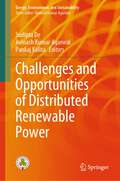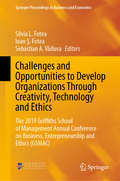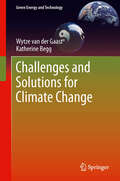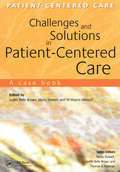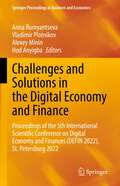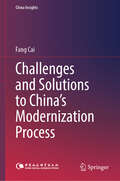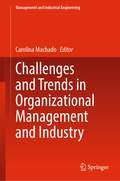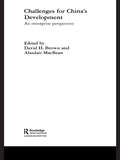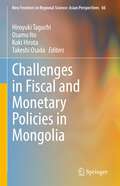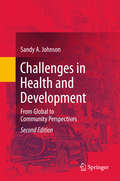- Table View
- List View
Challenge-Based Learning, Research, and Innovation: Leveraging Industry, Government, and Society (Palgrave Studies of Entrepreneurship and Social Challenges in Developing Economies)
by Arturo Molina RajagopalChallenge-based research focuses on addressing societal and environmental problems. One way of doing so is by transforming existing businesses to profitable ventures through co-creation and co-evolution. Drawing on the resource-based view, this book discusses how social challenges can be linked with the industrial value-chain through collaborative research, knowledge sharing, and transfer of technology to deliver value. The work is divided into three sections: Part 1 discusses social challenges, triple bottom line, and entrepreneurship as drivers for research, learning, and innovation while Part 2 links challenge-based research to social and industrial development in emerging markets. The final section considers research-based innovation and the role of technology, with the final chapter bridging concepts and practices to shape the future of society and industry. The authors present the RISE paradigm, which integrates people (society), planet (sustainability), and profit (industry and business) as critical constructs for socio-economic and regional development. Arguing that the converging of society and industry is essential for the business ecosystem to stay competitive in the marketplace, this book analyzes possible approaches to linking challenge-based research with social and industrial innovations in the context of sectoral challenges like food production, housing, energy, biotechnology, and sustainability. It will serve as a valuable resource to researchers interested in topics such as social challenges, innovation, technology, sustainability, and society-industry linkage.
Challenges In Economic And Financial Policy Formulation
by Abbas Mirakhor Zamir Iqbal Hossein AskariChallenges in Economic and Financial Policy Formulation provides an introductory, yet comprehensive, treatment of macroeconomic policies and their implementation in an Islamic-designed economic system.
Challenges and Controversies in Management Research (Routledge Advances in Management and Business Studies)
by Bill Lee Catherine CassellChallenges and Controversies in Management Research explores the history and cultural context, current issues and controversies and potential development of research in the field of management. The collection of essays is written by scholars of international standing, and the chapters address the development of management research in one or another continent, the need for global collaboration, the current state of management research and the development of the business school setting in which that research takes place. Factors affecting management research are explored in detail, giving consideration to the relationship between teaching, ethical conduct, publication, quality audits, collegiality and research. Contributions in the book also explore the development and usefulness of theories in management research and consider the relevance of management research and its applicability for management practice, policy-makers and the voluntary sector. A final section of contributions explores the future challenges for management research including the realization of reflexivity, the enduring gender bias of the management field, the future of theory, the patterns of development of new areas of management research and the need to manage large databases.
Challenges and Issues in Indian Fiscal Federalism (India Studies in Business and Economics)
by Naseer Ahmed KhanThis book discusses various dimensions of Indian fiscal federalism, focusing on the current fiscal imbalances - both vertical and horizontal - and their correction. Throwing light on different angles of this subject, it presents well-researched papers, which are divided into three sections. The first section, 'Fiscal federalism and resolving the fiscal imbalances', includes five chapters that discuss this theme and also explain the various strategies to remove the existing imbalances in India. 'Fiscal decentralization for high growth' which is the second section, explains how decentralisation leads to high economic growth and showcases empirical evidence from a few Indian states that are flourishing due to this policy. The third section, 'Emerging issues' offers six chapters describing several existing key concerns in fiscal federalism that have a major impact on achieving India's development goals. Including contributions from leading academics in this field, the book will be of great interest to research scholars and policy makers alike. "Besides addressing the core issue of fiscal imbalances and ways to correct them, the [chapters] touch on several issues confronting the Indian fiscal system at the centre , state and local levels. The [chapters] are well researched and well argued. The book is a valuable addition to the literature on Fiscal Federalism. " - Dr. C. Rangarajan, Ex-Governor of Reserve Bank of India; Chairman, Madras School of Economics, Chennai, India.
Challenges and Opportunities for Change in Food Marketing to Children and Youth
by Heather BreinerThe childhood obesity epidemic is an urgent public health problem. The most recent data available show that nearly 19 percent of boys and about 15 percent of girls aged 2-19 are obese, and almost a third of U. S. children and adolescents are overweight or obese (Ogden et al. , 2012). The obesity epidemic will continue to take a substantial toll on the health of Americans. In the midst of this epidemic, children are exposed to an enormous amount of commercial advertising and marketing for food. In 2009, children aged 2-11 saw an average of more than 10 television food ads per day (Powell et al. , 2011). Children see and hear advertising and marketing messages for food through many other channels as well, including radio, movies, billboards, and print media. Most notably, many new digital media venues and vehicles for food marketing have emerged in recent years, including Internet-based advergames, couponing on cell phones, and marketing on social networks, and much of this advertising is invisible to parents. The marketing of high-calorie, low-nutrient foods and beverages is linked to overweight and obesity. A major 2006 report from the Institute of Medicine (IOM) documents evidence that television advertising influences the food and beverage preferences, requests, and short-term consumption of children aged 2-11 (IOM, 2006). Challenges and Opportunities for Change in Food Marketing to Children and Youth also documents a body of evidence showing an association of television advertising with the adiposity of children and adolescents aged 2-18. The report notes the prevailing pattern that food and beverage products marketed to children and youth are often high in calories, fat, sugar, and sodium; are of low nutritional value; and tend to be from food groups Americans are already overconsuming. Furthermore, marketing messages that promote nutrition, healthful foods, or physical activity are scarce (IOM, 2006). To review progress and explore opportunities for action on food and beverage marketing that targets children and youth, the IOM's Standing Committee on Childhood Obesity Prevention held a workshop in Washington, DC, on November 5, 2012, titled "New Challenges and Opportunities in Food Marketing to Children and Youth. "
Challenges and Opportunities for Chinese Agriculture: Feeding Many While Protecting the Environment (China and Globalization 2.0)
by Wensheng ChenThis book elaborates on the transformation of agricultural development in China into the construction of a “resource and ecologically sound society”, and the coordinated development of industrialization, urbanization, and agricultural modernization in China. It focuses on the multiple goals of transforming the Chinese agricultural development model, inner motivations, approaches, and supporting systems under environmental and resource constraints. The author endeavors to build a theoretical framework for transforming agricultural development model in the construction of a “resource and ecologically sound society". To achieve this, the author addresses successively across seven chapters issues such as the multiple goals of China’s agricultural development transformation under resource and environmental constraints, the transformation of the utilization mode of resources, “resource and ecologically sound agriculture”–oriented agricultural production system transformation, the transformation of commercialized rural service system, and institutional innovations in the “resource and ecologically sound” agricultural transformation.
Challenges and Opportunities for Innovation in India
by Pankaj Prajapati Shweta Mishra Avneesh Kumar SinghThe conference was organized with the aim of providing a platform for experts, specialists, practitioners and researchers working in the field of technological and managerial innovation to share their views. It was instrumental in meeting the challenges and opportunities of technology and its application in today's technological world. It provided an excellent international forum to exchange knowledge resulting into the application of technological innovations and managerial practice. Eminent scientists and researchers across the country presented their work and discussed the prospects of innovative ideas in the field of science, engineering and management.
Challenges and Opportunities in Green Hydrogen Production (Energy, Environment, and Sustainability)
by Avinash Kumar Agarwal Paramvir Singh Anupma Thakur R. K. SinhaThis book comprehensively explores the dynamic landscape of green hydrogen, a transformative energy carrier. It offers a resource for researchers, professionals, and policymakers in sustainable energy. Starting with foundational understanding, it delves into hydrogen's importance, production methods, and climate change mitigation. This timely contribution addresses a knowledge gap by integrating green hydrogen's multifaceted aspects. By integrating multifaceted aspects, from fundamental principles to cutting-edge applications and societal implications, it provides a holistic grasp of green hydrogen's scientific, technological, and policy dimensions. The book navigates the intricate journey of green hydrogen production, spotlighting catalytic and technological breakthroughs, renewable energy integration, electrolyzer systems, and material strategies. Industrial applications and environmental impacts are detailed, covering life cycle assessments, water use, land considerations, and policy insights. This book caters to a diverse readership invested in sustainability and renewable energy transition. This book's multidisciplinary expertise guides the energy transition, fostering informed decision-making and inspiring collaboration. Policymakers, entrepreneurs, environmental experts, and researchers can find crucial implications, gain strategic insights, and explore ecological aspects. It endeavors to equip stakeholders with the knowledge, insights, and foresight needed to usher in a sustainable energy paradigm.
Challenges and Opportunities in the Artificial Intelligence Era
by Carolina Machado Joao Paulo DavimThis book contributes to a better understanding of the impacts that artificial intelligence (AI) has on organizations and how they reinforce opportunities while simultaneously overcoming the underlying risks. The importance of artificial intelligence in business innovation lies in AI's ability to drive efficient automation, provide strategic insights through advanced data analysis and catalyse the development of personalized products and services, resulting in more effective operations and agile responses to market demands. This book will be read by academics, researchers, managers, engineers, practitioners, and other professionals in different sectors of business and management.
Challenges and Opportunities in the Digital Era: 17th IFIP WG 6.11 Conference on e-Business, e-Services, and e-Society, I3E 2018, Kuwait City, Kuwait, October 30 – November 1, 2018, Proceedings (Lecture Notes in Computer Science #11195)
by Yogesh K. Dwivedi Antonis C. Simintiras Nripendra P. Rana Marijn Janssen Matti Mäntymäki Salah A. Al-Sharhan Luay Tahat Issam Moughrabi Taher M. AliThis book constitutes the refereed conference proceedings of the 17th IFIP WG 6.11 Conference on e-Business, e-Services and e-Society, I3E 201, held in Kuwait City, Kuwait, in October/November 2018.The 65 revised full papers presented were carefully reviewed and selected from 99 submissions. Topics of interest include, amongst others, the following: social media; information systems; marketing and communications; management and operations; public administration; economics, sociology, and psychology; e-finance, e-banking, and e-accounting; computer science and computer engineering; and teaching and learning.
Challenges and Opportunities of Circular Economy in Agri-Food Sector: Rethinking Waste (Environmental Footprints and Eco-design of Products and Processes)
by Vikas Kumar Rahul S Mor Anupama PanghalGlobal population by 2050 is predicted to be over 9 billion and accordingly, the production systems will demolish about 140 billion tons per year of minerals, ores, fossil fuels and biomass, i.e., thrice of the current need, and the food production itself has to be doubled. Optimized resource usage, lifecycle management, and reduced carbon emission have become a priority for agri-food businesses today, and circular economy (CE) helps for a sustainable and flexible way to grow without exhausting primary materials, and it thinks beyond recycling and resource usage. The word CE best relates to the resource and efficiency management, 6Rs, closed-loop production systems, zero waste and lifecycle engineering, reduced overconsumption of resources and waste generation, enriched system redesign and business model innovation, thereby leading to sustainable development goals. In this light, the book calls for theoretical and empirically sound contributions that are focused on the different aspects of the circular economy, 6R’s, sustainable production and consumption, closed-loop systems, etc. in the agri-food sector.
Challenges and Opportunities of Distributed Renewable Power (Energy, Environment, and Sustainability)
by Avinash Kumar Agarwal Sudipta De Pankaj KalitaDue to limited non-renewable resources and climate change problems, the global energy sector must be transformed from fossil fuel dominated to renewable energy based. However, due to constraints of resources, technology, locked capital in existing energy systems, limited financial support, and associated risks in investment, etc., this transformation is not expected to occur rapidly. Rather there should be an energy transition path with planned replacement of fossil fuel-based systems to renewable-based ones. Large-scale renewable power is yet to be dominant globally. Distributed renewable power is appearing to be more common as its implementation requires smaller investments with lesser financial risks. There are several options of such distributed renewable power with great prospects at different locations. Simultaneously, there are many challenges to overcome for successful implementation of such projects. These challenges are also multi-dimensional. In this book, several chapters address bright prospects of several options of distributed renewable power. Simultaneously, other chapters address challenges of implementation of such technologies. The chapters together cover a wide perspective of both prospects and associated challenges to be addressed for it. Chapters include technological issues, optimization of energy systems, logistics and policies, case studies etc. Researchers, industry professionals, and students can benefit from this book.
Challenges and Opportunities to Develop Organizations Through Creativity, Technology and Ethics: The 2019 Griffiths School of Management Annual Conference on Business, Entrepreneurship and Ethics (GSMAC) (Springer Proceedings in Business and Economics)
by Ioan Ş. Fotea Sebastian A. Văduva Silvia L. FoteaThis proceedings volume provides a multifaceted perspective on current challenges and opportunities that organizations face in their efforts to develop and grow in an ever more complex environment. Featuring selected contributions from the 2019 Griffiths School of Management Annual Conference (GSMAC) on Business, Entrepreneurship and Ethics, this book focuses on the role of creativity, technology and ethics in facilitating the transformation organizations need in order to be ready for the future and succeed.Growth and development have always been imperative for people, organizations, and societies and a relevant topic in the management sciences. Globalization, along with dramatic changes in social, cultural, and technological progress, are the main factors that determine the current conditions for development, putting forth a new set of challenges and opportunities that are putting pressure on organisations to adapt. Although technology and creativity seem to be the mantra for success in this new context, issues around the ethics of these two factors also seem to be crucial to the sustainability of growth in organizations.Featuring contributions on topics such as academic marketing, technology in healthcare organizations, ethical issues in hospitality, artificial intelligence and data mining, this book provides research and tools for students, professors, practitioners and policy makers in the fields of business, management, public administration and sociology.
Challenges and Solutions for Climate Change (Green Energy and Technology)
by Katherine Begg Wytze Van GaastThe latest scientific knowledge on climate change indicates that higher greenhouse gas concentrations in the atmosphere through unchecked emissions will provoke severe climate change and ocean acidification. Both impacts can fundamentally alter environmental structures on which humanity relies and have serious consequences for the food chain among others. Climate change therefore poses major socio-economic, technical and environmental challenges which will have serious impacts on countries' pathways towards sustainable development. As a result, climate change and sustainable development have increasingly become interlinked. A changing climate makes achieving Millennium Development Goals more difficult and expensive, so there is every reason to achieve development goals with low greenhouse gas emissions. This leads to the following five challenges discussed by Challenges and Solutions for Climate Change: 1. To place climate negotiations in the wider context of sustainability, equity and social change so that development benefits can be maximised at the same time as decreasing greenhouse gas emissions. 2. To select technologies or measures for climate change mitigation and adaptation based on countries' sustainable development and climate goals. 3. To create low greenhouse gas emission and climate resilient strategies and action plans in order to accelerate innovation needed for achieving sustainable development and climate goals on the scale and timescale required within countries. 4. To rationalize the current directions in international climate policy making in order to provide coherent and efficient support to developing countries in devising and implementing strategies and action plans for low emission technology transfers to deliver climate and sustainable development goals. 5. To facilitate development of an international framework for financial resources in order to support technology development and transfer, improve enabling environments for innovation, address equity issues such as poor people's energy access, and make implementation of activities possible at the desired scale within the country. The solutions presented in Challenges and Solutions for Climate Change show how ambitious measures can be undertaken which are fully in line with domestic interests, both in developing and in developed countries, and how these measures can be supported through the international mechanisms.
Challenges and Solutions in Patient-Centered Care: A Case Book
by Moira Stewart Judith Belle Brown Wayne WestonSeries Editors: Moira Stewart, Judith Belle Brown and Thomas R Freeman The application of the patient-centered clinical method has received international recognition. This book introduces and fully examines the patient-centered clinical method and illustrates how it can be applied in primary care. It presents case examples of the many problems encountered in patient-doctor interactions and provides ideas for dealing with these more effectively. It covers a wide range of topics and issues including palliative care, abuse, dying patients, ethical challenges and the role of self-awareness. Many narratives originate from patients' and family members' experiences, providing perspectives of great power and value. The Patient-Centered Care series is of great value to all health professionals, teachers and students in primary care.
Challenges and Solutions in the Digital Economy and Finance: Proceedings of the 5th International Scientific Conference on Digital Economy and Finances (DEFIN 2022), St.Petersburg 2022 (Springer Proceedings in Business and Economics)
by Anna Rumyantseva Vladimir Plotnikov Alexey Minin Hod AnyigbaThis volume presents the proceedings of the 4th International Scientific and Practical Conference on Digital Economy and Finances (DEFIN22) at the Saint-Petersburg University of Management Technologies and Economics (UMTE), which took place in March 2022. It includes the newest research on the impact of new digital technologies on the growth and capitalization of companies and the labor market. The volume discusses the problems of situational modeling of economic processes and the creation of "digital twins" of enterprises. The contributions analyse how big data and artificial intelligence technologies are shaping the financial markets.
Challenges and Solutions to China’s Modernization Process (China Insights)
by Fang CaiFocusing on these developing problems and growing troubles, this book mainly discusses economic growth issues related to demographic transition, as well as livelihood issues derived from them and closely related to policy logic. It aims to make theoretical analysis and provide necessary international experience and lessons and put forward targeted policy advice. This book proposes a three-pronged pattern of competition policy, industrial policy, and social policy to achieve productivity improvement and innovation momentum; gives full play to China's super-large market advantages, attractiveness and negotiating position; and promotes each other through domestic and international dual cycles to achieve a higher level of development.
Challenges and Trends in Organizational Management and Industry (Management and Industrial Engineering)
by Carolina MachadoThis book provides discussion and the exchange of information on principles, strategies, models, techniques, and applications related with the challenges and trends that competitive organizations are facing. It shows the challenges and trends in the market and the implications for their operation in organizations, providing a more effective knowledge about the field of organizational management and industry.
Challenges at the Interface of Data Analysis, Computer Science, and Optimization: Proceedings of the 34th Annual Conference of the Gesellschaft für Klassifikation e. V., Karlsruhe, July 21 - 23, 2010 (Studies in Classification, Data Analysis, and Knowledge Organization)
by Andreas Geyer-Schulz Lars Schmidt-Thieme Jonas Kunze Wolfgang A. GaulThis volume provides approaches and solutions to challenges occurring at the interface of research fields such as data analysis, computer science, operations research, and statistics. It includes theoretically oriented contributions as well as papers from various application areas, where knowledge from different research directions is needed to find the best possible interpretation of data for the underlying problem situations. Beside traditional classification research, the book focuses on current interests in fields such as the analysis of social relationships as well as statistical musicology.
Challenges for China's Development: An Enterprise Perspective (Routledge Contemporary China Series #Vol. 4)
by David H. Brown Alasdair MacBeanThe pace of reform for China’s enterprises of all kinds has quickened as they seek to cope with the challenges of self-determination in a rapidly evolving context of difficult social and welfare changes, and the realities of increasing global competition. This book explores these challenges from the perspective of the enterprise. It includes discussion of current and likely future overall trends, reports on new research findings on the true extent of governance and accounting reforms within enterprises, and considers the impact of increasing global competition on strategy, business relationships and management culture in a range of different kinds of enterprises.
Challenges for Indian Multinationals--The Global Future
by Nirmalya Kumar Pradipta K. Mohapatra Suj ChandrasekharIndian companies have transformed very quickly from small, tentative domestic players to competitive global powerhouses. Despite the bullish sentiment in India and the high level of confidence among Indian executives in their ability to manage multinational corporations, we must not forget that the "Indian multinational" is still in an embryonic stage. There is no reason to expect that the process of building the Indian global powerhouses, capable of operating seamlessly across the world, will be substantially faster than it was for Japanese and Korean multinationals like Toyota and Samsung. This chapter discusses the four major challenges that India's multinationals face on this journey. This chapter is excerpted from "India's Global Powerhouses: How They Are Taking on the World."
Challenges in Central Banking: The Current Institutional Environment and Forces Affecting Monetary Policy
by Pierre L. Siklos Martin T. Bohl Mark E. WoharChanges in the field of central banking over the past two decades have been nothing short of dramatic. Moreover, they have spanned the globe. They include the importance of central bank autonomy, the desirability of low and stable inflation, and the vital role played by how central banks communicate their views and intentions to the markets and the public more generally. There remains considerable diversity nevertheless in the institutional framework affecting central banks, the manner in which the stance of monetary policy is determined and assessed, and the forces that dictate the conduct of monetary policy more generally. The global financial crisis, which began in the United States in 2007, only serves to highlight further the importance of central bank policies. The aim of this volume is to take stock of where we are in the realm of the practice of central banking and considers some of the implications arising from the ongoing crisis.
Challenges in Classical Liberalism: Debating the Policies of Today Versus Tomorrow (Palgrave Studies in Classical Liberalism)
by Joshua C. Hall Alice L. KassensThis book examines contemporary policy debates from opposing perspectives. It considers seven key topics in today’s society: land use, education, international trade, health insurance, technological change, and recreational alcohol and drugs. Two scholars with differing viewpoints discuss each topic, one working in the classical liberal tradition and the other advocating slower, incremental societal change. While classical liberalism historically presents a vision of society comprised of free and responsible individuals, this book shows the importance of considering the nuances of this vision today. Beyond theoretical regulation vs. de-regulation debates, the book highlights challenges for classical liberals by considering how dynamism and creative destruction may disrupt communities, leading to worse outcomes for some groups. This edited volume aims to deepen understanding of this challenge to a free society and partake in and encourage civil intellectual discourse and debate. It will interest students and scholars from various fields, including economics, political science, public health, and environmental studies.
Challenges in Fiscal and Monetary Policies in Mongolia (New Frontiers in Regional Science: Asian Perspectives #66)
by Hiroyuki Taguchi Osamu Ito Koki Hirota Takeshi OsadaThis book provides quantitative evidence on the issues in fiscal and monetary policies in Mongolia and presents necessary policy recommendations for policymakers and academic circles. Mongolia belongs to a natural resource-based, transition economy and thus has faced the risk of the so-called resource curse—including the “Dutch Disease” and immaturity in market-based systems, particularly in financial markets. Consequently, reformations of resource allocation and policy governance in fiscal and monetary fields have been required. So far, however, there have been only a very limited number of quantitative studies in the Mongolian economy among the vast literature of Asian studies. This book applies scientific approaches to address fiscal and monetary issues, such as data-oriented and econometric methods (a structural vector auto-regression model, a spatial econometric model, and panel estimation with fixed effects, among others). In this manner, the book enriches empirical evidence in academic literature and also contributes to evidence-based policymaking. All the authors are young leaders of government officials in the Ministry of Finance, Financial Regulatory Commission, and National Statistics Office in Mongolia, who have been trained in academic research methodologies at Saitama University, Japan, on JICA-JDS scholarships. Thus, academic researchers and policymakers will be prominent members of the target audience for this work.
Challenges in Health and Development: From Global to Community Perspectives
by Sandy A. JohnsonAt the turn of the 21st century, human health and economic growth are inextricably linked components of international development. Challenges in Health and Development is a primer on the changing configurations of population health and economic growth in development policy. It examines strategies of investing in human health and investing in economic growth as distinct approaches to development, explores the symbiotic relationship of these tactics, and considers the applications and outcomes from a global, national and community level perspective. Each chapter introduces concepts of economic development and population health, and uses case studies to illustrate the same. These case studies include program and policy examples from Bangladesh, Chile, Haiti, Rwanda, South Africa and Sri Lanka. This text examines the impact of macroeconomic adjustment programs, health care restructuring, investment in primary health care, public-private partnerships, and the challenges of program coordination and up-scaling in stable and conflict-ridden countries. Discussion questions are provided at the end of each chapter to facilitate classroom activities health and economic growth are inextricably linked components of international development. Challenges in Health and Developmentis a primer on the changing configurations of population health and economic growth in development policy. It examines strategies of investing in human health and investing in economic growth as distinct approaches to development, explcomes of the same from a global, national and community level perspective. Each chapter introduces concepts of economic development and population health and uses case studies to illustrate the same. These case studies include program and policy examples from Bangladesh, Chile, Haiti, Rwanda, South Africa and Sri Lanka. This text examines the impact of macroeconomic adjustment programs, health care restructuring, investment in primary health care, public-private partnerships, and the challenges of program coordination and up-scaling in stable and conflict-ridden countries. Discussion questions are provided at the end of each chapter to facilitate classroom activities.
